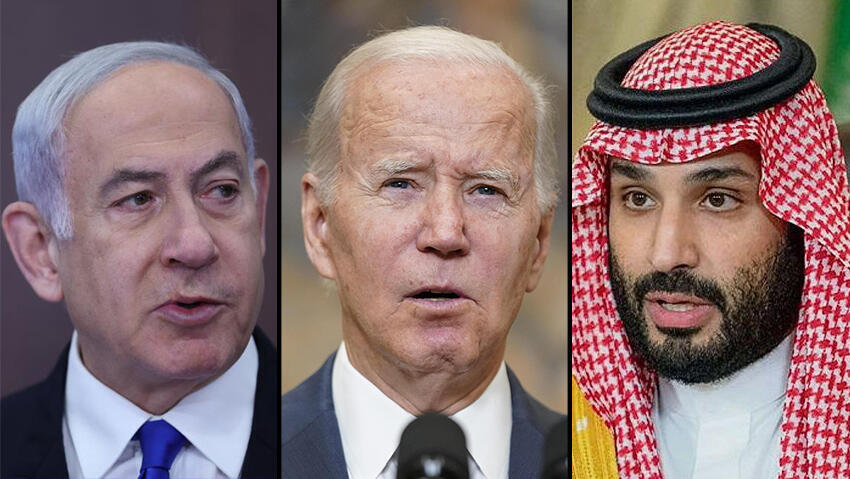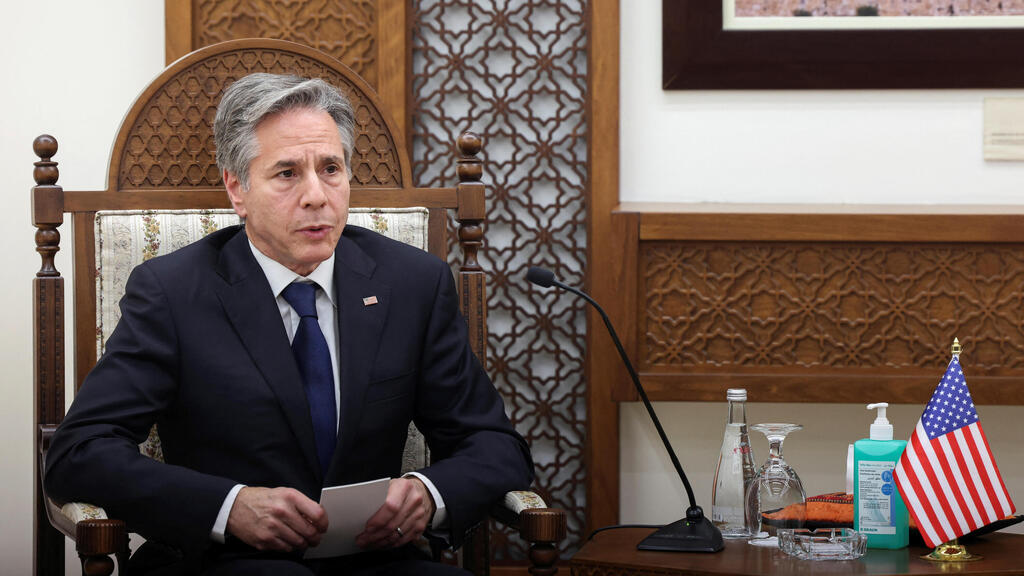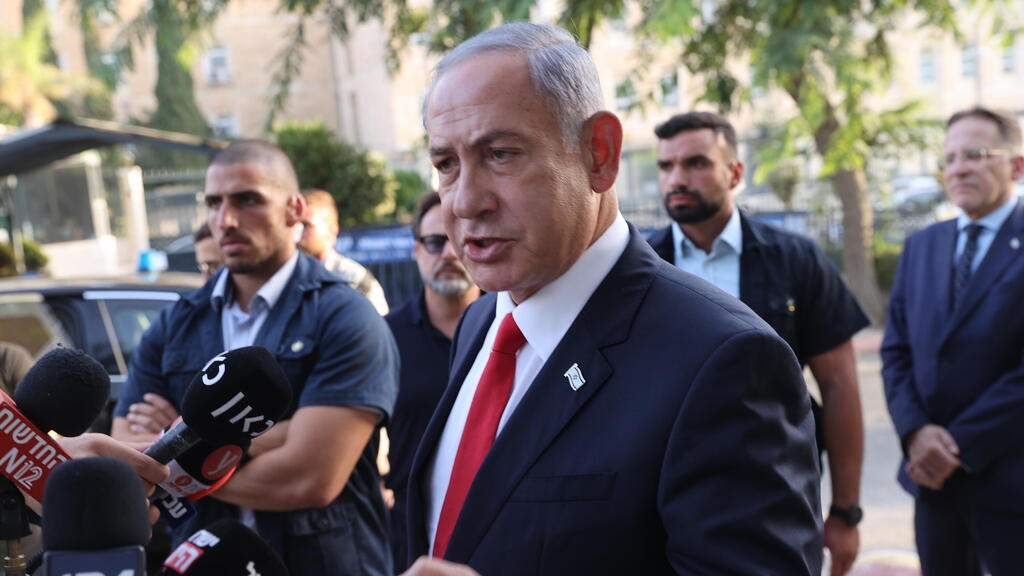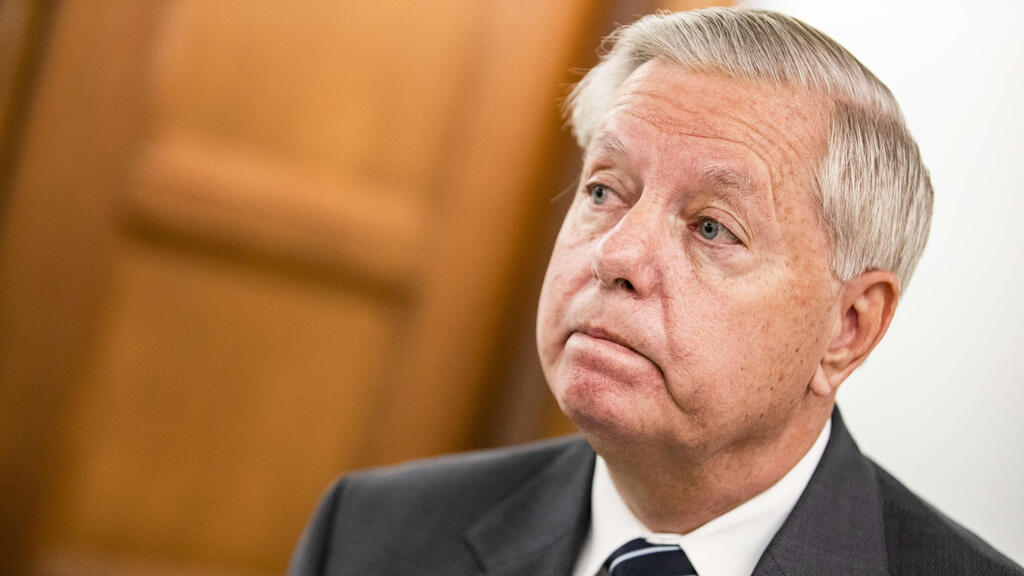After reports in the New York Times, revealed the quiet talks between the United States, Saudi Arabia, and Israel include discussions about a peaceful Saudi Arabian nuclear program, senior Israeli officials said agreements on the matter are far off.
Other stories:
The officials said it was not clear whether the Biden administration was willing or able to bring about as dramatic a move as a normalization of relations between Israel and the Saudis ahead of the 2024 election, partly because such a diplomatic agreement would involve Congressional approval for some of its components still, National Security Council Coordinator for the Middle East and North Africa, Brett McGurk, arrived in Saudi Arabia on Saturday to discuss normalization with Israel.
4 View gallery


Benjamin Netanyahu, Joe Biden, Mohammed bin Salman
(Photo: Yonatan Zindel, AP, Reuters)
According to the Times, in a report published by among others - Ronen Bergman from Ynet and its sister publication - Yedioth Ahronoth, the paper said one point being discussed was the need for Israel to agree to Saudi Arabia's program to enrich uranium. Such an agreement was considered unlikely since according to officials in Jerusalem, it would set off a nuclear arms race in the region.
The initial demands of Saudi Crown Prince Mohammed bin Salman in exchange for normalizing ties with Israel, according to the report, included "U.S. guarantees to defend Saudi Arabia from military attack, a Saudi-American partnership to enrich uranium for a civilian nuclear program, and fewer restrictions on U.S. arms sales to the kingdom."
The Saudis would have to make significant concessions and abandon their long-standing position that peace with Israel could only come after the establishment of a Palestinian state. Publicly, Saudi position remained unchanged since it presented its own Arab Peace Initiative in 2002, offering Israel a peace agreement in exchange for the establishment of an independent Palestinian state.
Just last month, shortly before meeting with U.S. Secretary of State Antony Blinken, MBS said that the Palestinian question remained central in the minds of Arabs and Muslims and is a leading component of the kingdom's foreign policy priorities.
Officials in Jerusalem can not say whether normalization of ties would be possible without Israeli concessions. They are aware that while the current right-wing and religious coalition is in power, the likelihood that there would be any progress on the Palestinian question is all but non-existent. But sources familiar with the details told The New York Times that both the Saudis and the Americans insist that a normalization deal would include concrete gestures to the Palestinians, albeit far from full statehood.
CIA Director William Burns was also involved in discussions with Riyadh. He joined Sullivan and McGurk in a diplomatic effort to rehabilitate the Biden Administration's ties with the Saudi palace, with the aim to prevent the budding relations with China and Iran from gaining hold.
Biden hopes for achievements in the Middle East ahead of the 2024 elections, to show Americans that he has not abandoned the Middle East and is advancing American interests without putting American lives at risk.
After Blinken and the Saudi Crown Prince met at the beginning of the month, the U.S. Secretary of State had a 40-minute conversation with Prime Minister Benjamin Netanyahu. According to reports, Blinken provided Netanyahu with detailed briefings on the Saudi demands in exchange for a move toward normalization. Netanyahu, too, had his own demands, as reported by the Times. The phone call between the two, according to American sources, was a "turning point" in the ongoing efforts of the Biden administration to mediate between the sides.
A peace agreement with Saudi Arabia would be considered a significant achievement for Netanyahu, something he desperately needs in the current political state and against the backdrop of his government's performance. On the other hand, the provision of uranium enrichment capability to Saudi Arabia contradicts Israel's declared policy that every effort should be made to prevent any country in the Middle East from possessing nuclear capability Should Netanyahu give any kind of content on the matter, he may face sharp opposition from within his own security establishment.
American officials have said there was less than a 50% chance for a deal to be reached. Blinken himself said he had “no illusions” that the path to a deal would be quick. Still, a normalization of relations between Saudi Arabia and Israel would be one of the most dramatic events in a continued realignment of the Middle East and according to the New York Times be the first time that a major Arab nation would push the Palestinian question down on its list of priorities.
For American officials, the normalization of ties between Riyad and Jerusalem is of strategic importance because it would interfere with Chinese efforts to gain influence in the region. “Biden has decided to go for it, and everyone in the administration now understands that the president wants this,” former U.S. Ambassador to Israel Martin Indyk said.
A new defense agreement or a civilian nuclear agreement with Saudi Arabia, which is reportedly on the table, would face an additional obstacle: obtaining approval from a polarized Congress, where several prominent members of Biden's Democratic Party are likely to vote against it. However, amidst the ongoing talks, "odd" political alliances have also formed, with one prominent Republican senator, Lindsey Graham of South Carolina, quietly assisting the White House’s negotiations.
A source in the National Security Council responded to the Times report by stating that Biden's Middle East policy includes efforts to expand and strengthen the Abraham Accords, as well as efforts to normalize relations between Israel and Saudi Arabia.
Netanyahu himself is not hiding his hopes for a deal with the Saudis. Just last week, in an interview with "Sky News," he sent a message to Riyadh: "Our hand is extended to all Arab States and certainly to Saudi Arabia which is vitally important," he said. "We have great opportunities to advance the peace in our region, peace between our two countries, and the wellbeing of our peoples. I think it would change history," he said.
"Obviously Saudi Arabia would be a quantum leap forward because it's the most influential Arab country not only in the Arab world I think also in the Muslim world, so it would fashion I think the possibility of ending the Arab-Israeli conflict, and I think that it would also help us solve the Palestinian-Israeli conflict," Netanyahu told Sky News.





